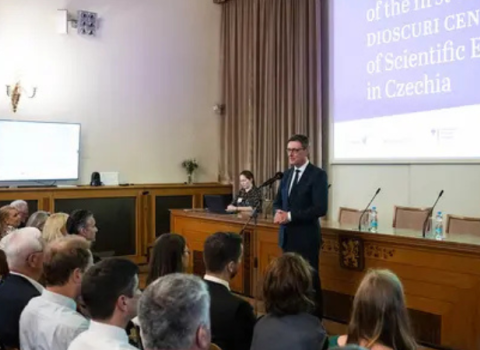Messy communication around an EU ban on 21 Hungarian universities accessing Horizon Europe funds has had a terrible impact on Hungary’s participation in the programme and relationships with European partners, Hungarian authorities say. The ban is on funding, not participation, but this is not well understood and a hesitancy to work with Hungarian partners has spread around Europe. A new letter from the Commission seeks to clarify the situation.
Elsewhere, a project to build new scientific infrastructure for Ukraine in Poland receives a financial boost, and an Estonian professor argues in favour of funding more science with Widening measures. Finally, Poland’s space tech companies are going to benefit from playing a leading role in the design of two new satellite constellations being built later this decade.

The latest news
HUNGARY DECRIES MISINFORMATION: The European Commission has sent out a letter to Europe’s research community reminding them that Hungarian universities can still participate in Horizon Europe projects, even if some cannot receive funding through the programme. The letter, written by the head of the Commission’s research directorate, Marc Lemaître, comes after Hungarian authorities say misinformation on the topic has led to Hungarian research teams being left out in the cold. Read our full story here.
POLAND LOOKS TO THE STARS: Poland is set to massively increase its earth observation capabilities with the creation of two new satellite constellations, one for civilian purposes and the other defence. While there will be obvious benefits once the satellites are up, the country’s space technology ecosystem will also benefit with Polish companies heavily involved in the design. Ian Mundell has the story.
A BEAMLINE FOR UKRAINE: A project to build a beamline in Poland for Ukrainian scientists has received a welcome €1 million grant from the Swiss National Science Foundation, but the project still needs another €3.5 million. Ukrainian scientific infrastructure has been devastated over the past two years, making the Light for Ukraine project all the more valuable. Find out more here.
WIDENING NEEDS RESEARCH, NOT NETWORKING: Looking ahead to Horizon Europe’s successor programme, FP10, it is imperative that the Widening measures also include support for research activities, not just networking and capacity building. University of Tartu professor Toivo Maimets lays out his vision for the future of the Widening.
HAVE SOMETHING TO SAY? We welcome opinion pieces and other contributions on R&I policy in central and eastern Europe. Send yours to [email protected].
In other news
NEW WIDENING FIGURES: A total of €796 million was spent on Horizon Europe Widening measures between 2021 - 2023, new figures published by the European Commission show. Just 19% of all applications came from Widening countries, or 23% of all EU applications, but the fact that Widening countries are home to around 26% of the EU’s scientists and engineers shows the number of applications is not far from the expected amount. Despite this, the success rate for entities in Widening countries is 19.6%, below the average of 21.6%.
ERC IN CZECHIA: President of the European Research Council (ERC) Maria Leptin will travel to Czechia for a two-day trip on June 12 and 13 to meet members of the Czech government, ERC grantees and the wider research community. The trip will include speeches at scientific conferences, a press point with Czechia’s deputy minister for Science, Research and Innovation, Pavel Dolecek, and discussions with Czechia’s government and scientific community. Find out more here.
CZECH EDUCATION NEEDS FUNDING: Czechia’s prestigious Charles University is calling on the government to support a proposal from the science and education ministry to increase the country’s budget for educational activities by over €240 million next year. “The management of Charles University has long pointed out that if we want to promote a knowledge-based economy in the Czech Republic, i.e. an economy with higher added value, and thus develop the long-term prosperity of our society, it is essential to pay attention to the support of education, research, development and innovation,” the university wrote in a statement.
POLAND’S R&D JOURNEY: In the latest episode, EU funding podcast The Grant dives into how Poland’s R&D landscape has evolved in the 20 years since the country joined the EU in 2004. Listen to the podcast here, with guests Ewa Kocinska-Lange from the Brussels office of Poland’s National Centre for Research and Development (NCBR) and Magdalena Bem-Andrzejewska, director of National Contact Point at NCBR.
ROMANIA-KOREA AEROSPACE AGREEMENT: Romania’s National Institute for Aerospace Research “Elie Carafoli” (INCAS) has signed an R&D cooperation agreement with South Korean private company Hanwha Aerospace. The two parties will work together on the development of weapons systems.
NEW MYANMAR CENTRE IN CZECHIA: A new Myanmar Studies Center has been opened at Palacký University Olomouc in Czech Republic to deepen research and understanding of Myanmar and the wider southeast Asian region. The centre is funded by Horizon Europe and will offer public lectures and academic courses on various topics related to the region. “So far, this region has not received much professional attention. We are committed to filling this gap by supporting interdisciplinary research and education focused on Myanmar,” said Kristina Kironská, the centre’s director.
BOSNIA AND HERZEGOVINA’S HORIZON PROGRESS: The European Commission has highlighted Bosnia and Herzegovina’s good progress in Horizon Europe participation at a recent joint R&I committee meeting. It is the second such meeting, with the first taking place in March 2023. The Commission noted the country’s progress on the green and digital transitions, and stated its willingness to continue to help the country in capacity building and integration into the European research and innovation areas.
Mark your calendars
LJUBLJANA, 5-8 JUNE: The European network of science centres and museums (Ecsite) is hosting its 2024 conference at the Kersnikova Institute in Ljubljana. There will be over 300 speakers including Slovenian Prime Minister Robert Golob, and MIT researchers Hugh Herr and Ana Rajcevic. Topics will range from AI, accessibility, fundraising, research and evaluation and more. Find out more here.
BRNO, 13 JUNE: European Research Council president Maria Leptin is to visit Prague where she will give a speech at the “ERC Scientific Mini-conference”. More information here.
ONLINE, 14 JUNE: With the MSCA4Ukraine scheme having recently received an additional €10 million in EU funding, a webinar will take place to relaunch the scheme and provide information for applicants interested in the 2024 call for proposals. The MSCA4Ukraine scheme has to date supported 125 researchers from Ukraine in continuing their academic work.
KYIV, 18 JUNE: Founders, investors and public institutions will gather in the capital city of Ukraine to talk about uplifting the tech ecosystem in the war-torn country. Read more about PowerUp Ukraine here.
WARSAW, 29-30 OCTOBER: The Deep Tech CEE Summit offers a chance to dive into the goings on in central and eastern Europe and connect with like minded entrepreneurs. There is also an investors’ day on 28 October. Find out more here.
The Widening newsletter is a roundup of news and analysis of research and innovation policy and investments in central and eastern Europe, delivered to your inbox twice a month. Sign up here.





 A unique international forum for public research organisations and companies to connect their external engagement with strategic interests around their R&D system.
A unique international forum for public research organisations and companies to connect their external engagement with strategic interests around their R&D system.